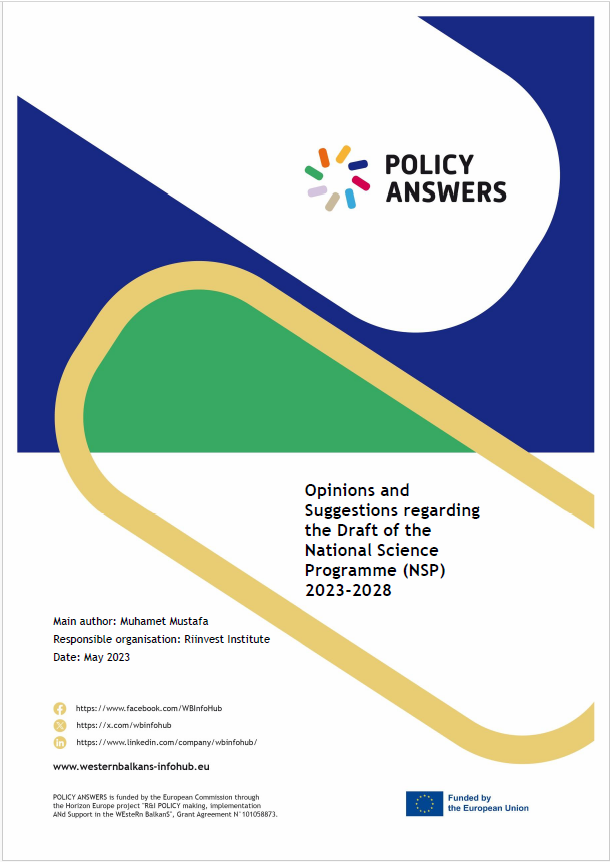This POLICY ANSWERS Brief was prepared in May 2023 by Muhamet Mustafa and published by the Riinvest Institute.
This brief presents an overview of an extensive discussion organised by the Riinvest Institute on 18 April 2023, as part of the public debate on the ‘National Science Programme 2023-2028 (NSP)’ prepared by the National Science Council (NSC). The participants included researchers and stakeholders of the Horizon Europe (HE) funded project POLICY ANSWERS of which Riinvest is a partner, as well as Riinvest associates from Kosovo* and the diaspora.
The 2023-2028 NSP draft holds particular significance as it comes at a time when Kosovo needs to make pivotal strides in supporting the field of Research and Innovation (R&I) to foster sustainable economic development and increase its to-day modest participation in the European Research Area (ERA). The Riinvest Institute is actively engaged in a series of research and advocacy activities within the POLICY ANSWERS project to create a supportive environment for research and evidence-based innovation activities, promoting policies grounded in evidence. After introductory remarks by Isuf Berisha (a member of the POLICY ANSWERS project team) and initial comments from Gersa Latifi (Technical University Munich, TUM) and Pellumb Çollaku (Riinvest Associate), a lively discussion ensued among both in-person and virtual participants. The entire debate was broadcasted through social networks (Riinvest Institute’s Facebook page and the “Ekonomia Online” portal).
It was acknowledged and appreciated that the NSC, in its new composition, managed to draft this document within a reasonable timeframe, prioritising this crucial work and making it available for consultation with relevant stakeholders. Positive recognition was also given to the fact that the NSP is an inclusive document that supports the Council’s objectives, with a particular focus on enhancing the capacity of higher education and research institutions to strengthen their absorptive capacities for advancing R&I in support of development policies in Kosovo and thereby increasing Kosovo’s participation in the ERA. In its efforts to improve its position in this field, Kosovo is a net contributor, contributing more than it currently gains financially under the most important programme, Horizon Europe. Participants in the discussion noted as a positive aspect that the programme is focused on improving the environment for meaningful engagement of the research community and research institutions. As such, it is expected to contribute to both the quantitative and qualitative growth of research and innovation outcomes in Kosovo.
During the engaged discussion, participants also emphasised the need to refine certain parts of the Programme further, especially in defining the expected results of research activities in the fields and programmes to be intervened. Greater selectivity regarding intervention fields was suggested to create a critical mass of funds for achieving objectives. Among other things, it was suggested that, instead of creating new administrative bodies, there should be a preference for building capacities in universities by establishing new research units where they do not exist within faculties and departments while simultaneously consolidating and enhancing the research profile of existing research institutes and centres. In this way, the implementation of this Programme should not only reduce administrative burdens but also elevate the field of R&I into a qualitatively new sphere, transitioning from a primarily individual effort-based field that results in publications in journals to a system that consolidates these efforts and creates the necessary synergy and interconnection with university education processes, contributing to the needs of societal development and greater integration into the European Research Area. Furthermore, it was suggested to strengthen and better articulate support of research projects related to sources and factors for economic growth within the country, as well as economic convergence with the European Union (EU) and regional cooperation.
The anticipated volume of public funds allocated for implementing this Programme, while seemingly improved compared to previous periods, in relative terms of its weight in projections for Gross Domestic Product (GDP) and Kosovo’s budget participation, does not represent the necessary breakthrough, not only compared to EU Member States but also compared to countries in the region.

